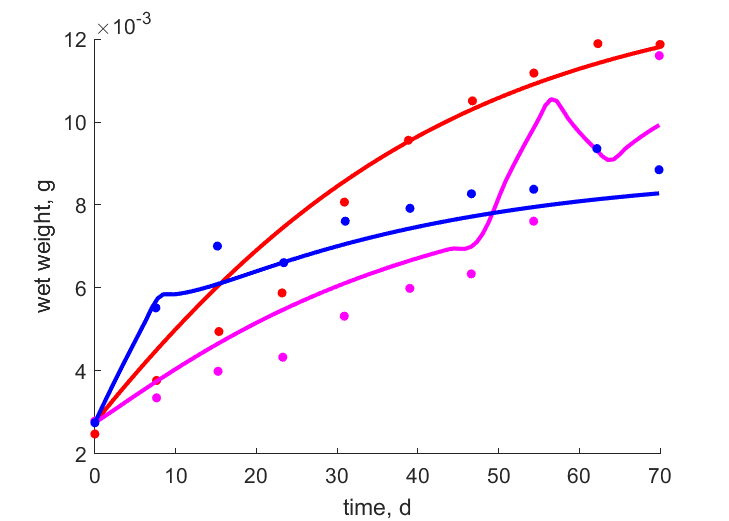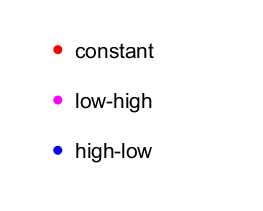Predictions & Data for this entry
| Model: abj | climate: Am, Cfa, Dfa, Dfb | migrate: | phylum: |
| COMPLETE = 3.0 | ecozone: THn, TN | food: biCi | class: |
| MRE = 0.042 | habitat: 0jTf, 0jTg, 0iTi | gender: D | order: |
| SMSE = 0.005 | embryo: Tnsf | reprod: O | family: |
Zero-variate data
| Data | Observed | Predicted | (RE) | Unit | Description | Reference |
|---|---|---|---|---|---|---|
| tp | 45 | 48.12 | (0.06939) | d | time since birth at puberty | MarcRich2008 |
| am | 365 | 365 | (5.859e-05) | d | life span | ADW |
| Li | 1.33 | 1.33 | (0.0001325) | cm | ultimate cephalothorax length for female | ADW |
| Lim | 0.92 | 0.9202 | (0.0002659) | cm | ultimate cephalothorax length for male | ADW |
| Wwb | 0.00017 | 0.0001674 | (0.01515) | g | wet weight at birth | Yosh2005 |
| Wwp | 0.01 | 0.01027 | (0.02688) | g | wet weight at puberty | MarcRich2008 |
| Wwi | 0.082 | 0.08501 | (0.03666) | g | ultimate wet weight | guess |
| Ri | 7.357 | 7.204 | (0.0208) | #/d | maximum reprod rate | ADW |
Uni- and bivariate data
| Data | Figure | Independent variable | Dependent variable | (RE) | Reference |
|---|---|---|---|---|---|
| tW_C |   | time | wet weight | (0.065) | MarcRich2008 |
| tW_LH |   | time | wet weight | (0.1628) | MarcRich2008 |
| tW_HL |   | time | wet weight | (0.06221) | MarcRich2008 |
Pseudo-data at Tref = 20°C
| Data | Generalised animal | Tetragnatha versicolor | Unit | Description |
|---|---|---|---|---|
| v | 0.02 | 0.02259 | cm/d | energy conductance |
| kap | 0.8 | 0.5569 | - | allocation fraction to soma |
| kap_R | 0.95 | 0.95 | - | reproduction efficiency |
| p_M | 18 | 215.3 | J/d.cm^3 | vol-spec som maint |
| k_J | 0.002 | 0.002 | 1/d | maturity maint rate coefficient |
| kap_G | 0.8 | 0.8009 | - | growth efficiency |
Discussion
- Males are assumed to differ from females by {p_Am} only
- Digestgion efficiency turns out to depend on food supply rate, and seems proportional to length
Bibliography